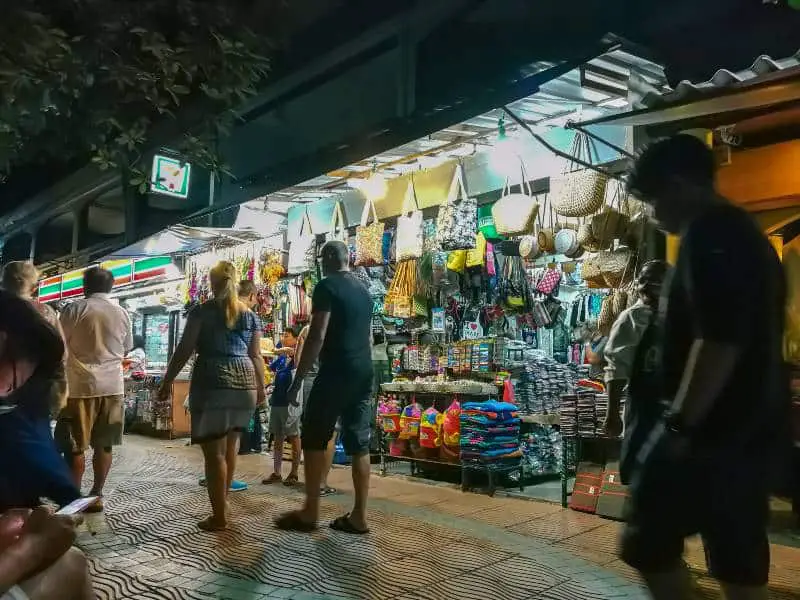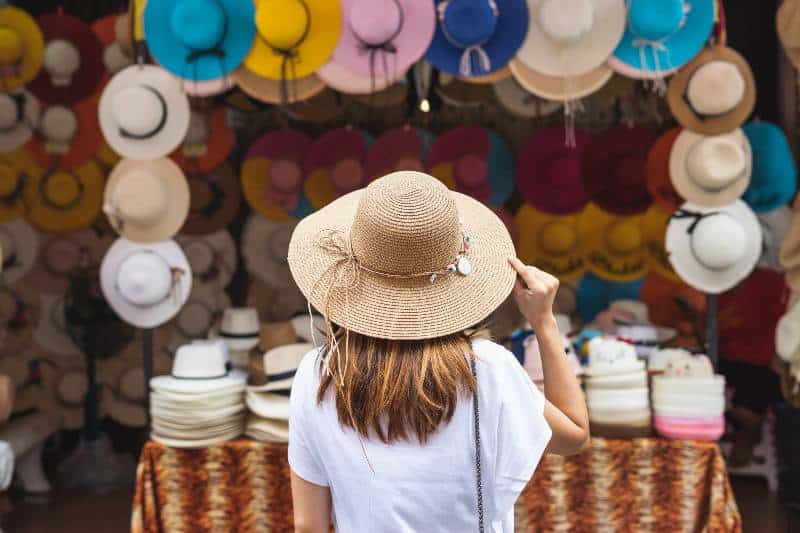Best Thai Souvenirs You Have to Bring Home
Have you ever gone to Thailand and wanted to bring back something special for yourself or your friends and family? Souvenirs are a great way of bringing back memories from your travels, so why not consider some unique Thai souvenirs this time around? In this blog post, we’ll be exploring some of the best Thai souvenirs that are sure to bring smiles and delight. From conventional options like traditional handicrafts and spiced tea to unconventional alternatives such as handcrafted jewelry and handmade bags – there is something for everyone! So let’s take a closer look at these top-notch souvenir ideas sourced from the Land of Smiles.
Thai souvenirs capture the nation’s essence: vibrant handmade silk, intricate traditional dolls, aromatic spices and curry pastes, exquisite wooden carvings, unique silver jewelry, and beautifully handcrafted soap flowers. Each piece embodies Thailand’s rich culture, making them perfect keepsakes from the Land of Smiles.
Key Takeaways
- When shopping for Thai souvenirs, it’s essential to ensure you’re purchasing genuine products to truly appreciate the craftsmanship and tradition behind them.
- In Thailand, bargaining is not just about getting a good deal but also about respecting cultural norms and building rapport with sellers.
- Beyond their aesthetic or utility, Thai souvenirs serve as tangible memories of your journey, encapsulating the essence of Thailand’s rich culture and heritage.

History of Thai Souvenirs
Thai souvenirs have a rich history that stems from the country’s vibrant culture, traditions, and craftsmanship. These keepsakes showcase a glimpse of Thailand’s heritage and serve as timeless mementos for both locals and tourists. The origins and significance of traditional Thai souvenirs lie in the following aspects:
Ancient Art and Craftsmanship
Thai craftsmanship dates back to the ancient periods of the Ayutthaya and Sukhothai Kingdoms. Skilled artisans were patronized by the royal family, who recognized the talent and importance of preserving traditional Thai crafts. These artisans were responsible for producing beautifully crafted items, such as ceramic pottery, textiles, and intricate wood carvings, that have become popular souvenirs in contemporary times.
Cultural Diversity Influenced by Trade
Thailand’s strategic location as a trading post in Southeast Asia facilitated the exchange of goods, culture, and knowledge. This fusion of cultures led to diverse styles and designs in Thai art and craft. For example, the famous Benjarong porcelain—a multi-colored, hand-painted pottery—originated from ancient Chinese porcelain making techniques, that Thai artisans later developed and adapted with unique Thai characteristics.
Spiritual Significance
Many traditional Thai souvenirs are closely connected to religion and spirituality. As the majority of Thailand’s population follows Buddhism, spiritual themes often feature prominently in art forms like paintings and sculptures. Amulets bearing images of Buddhist deities, monks, and landmark temples hold special significance in Thai culture, making them popular keepsakes for protection and good fortune.
Folklore and Traditional Characters
Thai folklore and mythology play a significant role in traditional art and crafts. Souvenirs often depict mythological characters and traditional stories, preserving Thailand’s rich storytelling tradition. One such example is the Ramakien, Thailand’s national epic derived from the Indian Ramayana epic. Hand-painted masks portraying the story’s characters are popular collectibles, utilized in traditional Khon dance performances.
Local Materials and Sustainable Craftsmanship
Thailand’s diverse natural resources inspire the creation of unique souvenirs. Local materials like coconut shells, bamboo, and rattan are used in crafting eco-friendly keepsakes. The famous Thai silk, boasting a long history of traditional silk-weaving techniques, is sought-after for its luxurious quality and vivid colors. These sustainable souvenirs serve as a reminder of Thailand’s commitment to preserving its environment and traditional craftsmanship.
In summary, Thai souvenirs embody the rich history, cultural diversity, spirituality, folklore, and sustainable craftsmanship that form the country’s heritage. These traditional keepsakes serve as cherished reminders of Thailand’s fascinating legacy and provide a connection to its vibrant traditions for both locals and travelers alike.
Top Thai Souvenirs to Bring Home
Ready to step up your souvenir game and forever be known as the best gift-giver among your friends? Get ready, because here’s our outstanding list of the top Thai souvenirs to grab on your next journey to the Land of Smiles!
- Handmade Thai Silk: Jazz up your fashion game with a rich, stylish piece of Thai silk. Handmade and boasting vibrant colors, this smooth fabric is as versatile as it is exquisite. From fashion-forward scarves to statement-making ties, dress like a winner and feel like one too!
- Traditional Thai Dolls: Add some cultural charm to your home with delightful, handcrafted Thai dolls that depict compelling Thai folk tales. A telling piece of Thailand’s culture and artisan heritage, these dolls are sure to spark fascination and conversation at your next dinner party.
- Thai Spices and Curry Pastes: Challenge your inner MasterChef with tempting Thai spices and curry pastes. Recreate aromatic Thai dishes at home and send your taste buds on an authentic culinary adventure.
- Wooden Carvings and Sculptures: Bring a piece of Thai craftsmanship into your living space with intricately carved wooden sculptures. From captivating Buddha statuettes to bold animal figurines, these pieces will become cherished conversation-starters in your home.
- Thai Silver Jewelry: Delight your favorite fashionistas with stunning Thai silver jewelry. Their traditional designs paired with contemporary craftsmanship are a surefire way to radiate elegance and charm.
- Elephant-themed Souvenirs: How about taking home a symbol of Thailand’s forest giants? Elephant-themed souvenirs ranging from carved statuettes to printed textiles pay homage to Thailand’s national animal in the most artful manner!
- Thai Coconut Oil Products: Get a spa-like experience at home with all-natural, Thai coconut oil products. Known for its moisturizing and revitalizing abilities, treat yourself with a tranquil, tropical-inspired pampering session.
- Traditional Thai Hats and Clothing: Step into the limelight with traditional Thai hats and clothing. From farmer’s hats to authentic handprinted cotton shirts, you can sport a cultural style statement that’s rich in tradition and absolutely runway-ready!
- Thai Tea and Coffee: Begin your mornings with the exotic flavors of Thai tea and coffee. Whether you’re a fan of the sweet and alluring Thai Iced Tea or the robust Arabica coffee from the northern hills, these brews promise a flavorful start to every day.
- Handcrafted Soap Flowers: Lastly, enchant your senses with handcrafted soap flowers. These vibrant, fragrant soaps mimic delicate Thai blossoms and turn an ordinary bath into a luxurious, aromatic escape.
Remember, it’s not just about bringing home a memento; it’s about taking a piece of Thailand’s rich culture, art, and traditions with you. These souvenirs are not just items but stories, experiences, and a reflection of a vibrant, diverse culture waiting to be explored and appreciated. Happy shopping!
Where to Buy Authentic Thai Souvenirs
Yearning for a piece of Thailand to bring back home? Here’s your go-to guide on where to buy authentic Thai souvenirs in some of Thailand’s popular destinations. Plus, we’ll share some savvy shopper tips to help you navigate away from counterfeit products.
Bangkok
- Chatuchak Weekend Market: One of the world’s largest markets, Chatuchak is your one-stop shop for everything from traditional Thai art to handmade clothing.
- MBK Center: Dubbed ‘Bangkok’s Bargain Paradise’, MBK is a vast shopping complex where you can find an array of Thai silk, art, crafts, and more.
- Asiatique The Riverfront: A flashy open-air market, Asiatique blends shopping and night-time entertainment. Look out for handmade crafts, Thai silk, and unique jewelry pieces.
Chiang Mai
- Sunday Walking Street: On Sundays, the old town transforms into a lively market. Amidst the bustling stalls, you’ll find traditional Thai clothing, arts, and crafts.
- Warorot Market: This is the best place to buy Thai spices, snacks, and textiles at very affordable prices.
- Nimman Road: Known for its boutique shops, Nimman is your destination for stylish Thai clothing, art pieces, and high-quality tea and coffee.
Phuket
- Phuket Old Town Night Market: The historic district lights up in the evening with stalls selling unique souvenirs, local artwork, and jewelry.
- Ban Boran Textiles: Ban Boran is the perfect destination to buy rare, authentic Thai silk and vintage Batik fabric.
- JungCeylon Shopping Mall: Located in the heart of Patong, this modern mall offers a wide selection of products, including Thai silk clothing and spa products.
Tips to Avoid Counterfeit Products
- Know the Genuine Article: Do your homework on what the real deal looks like. Is it hand-made or machine-made? What materials are used? Consider researching online or asking locals or tour guides.
- Check Labels: Authentic products usually have labels indicating their origin. “Made in Thailand” is a good indicator of an authentic souvenir, while some products like Thai silk will have a ‘Peacock Emblem’, indicating authenticity.
- Price Point: If the price seems too good to be true, think twice. Authentic items, particularly handmade ones, tend to be priced higher due to quality and craftsmanship.
- Buy from Reputable Sellers: Avoid buying from sidewalk stalls or overly-touristy areas known for counterfeit products. Shops in local markets are often more reliable, and government run shops can guarantee authenticity.
Shopping for authentic Thai souvenirs can be a memorable part of your trip. It allows you to engage with the local culture while finding meaningful mementos to bring back home. Happy hunting!
How to Bargain for Souvenirs in Thailand
Bargaining is a traditional practice in Thailand’s bustling markets, and knowing how to negotiate for souvenirs can be an exciting and rewarding experience. Before diving into the world of haggling, it’s important to understand the cultural norms and etiquettes, and pick up some handy tips and tricks to ensure you get the best deals.
Cultural Norms and Etiquettes
- Stay Friendly and Polite: Thai people are renowned for their friendly demeanor—in fact, Thailand is known as the “Land of Smiles.” To maintain this positive atmosphere, always bargain with a respectful and diplomatic attitude, and avoid aggressive behavior or raised voices.
- Use Humor and Creativity: Inject some light-heartedness into the bargaining process by using humor or compliments. A diplomatic and friendly approach will typically result in better interactions and potentially better prices.
- Respect the Seller’s Livelihood: Remember that vendors are trying to provide for themselves and their families. Bargaining is customary, but aiming for extreme discounts can be harsh and disrespectful. Strive to reach a price that is favorable for both parties.
- Know When to Walk Away: If bargaining doesn’t result in the desired price, be prepared to walk away courteously. Sometimes, the act of walking away prompts the seller to lower the price, but if not, simply accept it and try at another stall. There are plenty of unique souvenirs to be discovered across Thailand’s markets.
Tips and Tricks for Getting the Best Deals
- Do Your Research: Familiarize yourself with average prices for traditional Thai souvenirs and other items you’re interested in purchasing. Check out multiple stalls to compare prices and, if possible, seek advice from locals, tour guides, or hotel staff.
- Shop Early: When the market first opens, some vendors believe their first sale brings them good luck for the rest of the day. As a result, they may be more open to offering discounts during that time. Plus, you’ll have less competition from other tourists.
- Bundle Up: Buying more than one item from a vendor? You’re likely to receive a discount for purchasing multiple items. Combining your purchases from one stall can lead to better overall deals.
- Have Cash Handy: Carry small bills and change to facilitate quicker transactions. Sellers may be more open to bargaining if you can pay the agreed price immediately and with cash.
- Start Low, But Not Too Low: Make an opening offer that’s low, but not insultingly so. A reasonable starting price is typically 30-50% lower than the vendor’s proposed price. Remember, the goal is to reach a mutually beneficial result.
- Stay Confident: Exude confidence in your bargaining skills and the knowledge of the item’s worth. Staying firm but polite can work wonders in encouraging vendors to offer their best deals.
Bargaining for souvenirs in Thailand is a thrilling cultural experience, and by mastering these etiquette tips and tricks, you will be well on your way to landing great deals on cherished mementos. Happy shopping—and don’t forget to have fun along the way!

Best Thai Souvenirs FAQs
What is Thailand’s famous souvenir?
Thailand is known for its vibrant and intricate handicrafts, particularly hand-woven silk and Batik fabrics, as well as beautiful Buddha statues. Thai snacks and spices are also popular souvenirs, along with artwork and jewelry made by local artisans.
Where can I find authentic Thai souvenirs?
Authentic Thai souvenirs can be found in local markets, government-run shops, and designated handicraft villages across the country. Avoid buying from overly-touristy areas known for counterfeit products.
What should I keep in mind when bargaining for souvenirs in Thailand?
Be friendly, polite, and respectful of the seller’s livelihood. Do your research to know average prices and shop early for better deals. Start with a low but reasonable offer and stay confident in your bargaining skills. Remember to have fun along the way! Overall, be mindful of cultural norms and etiquettes when bargaining in Thailand.
Is it customary to bargain for souvenirs in Thailand?
Yes, bargaining is a common practice in Thai markets, and sellers often expect customers to negotiate for better prices. It’s part of the fun and experience of shopping for souvenirs in Thailand.
Can I use credit cards for souvenirs in Thailand?
Most vendors in local markets and smaller shops only accept cash, so it’s best to have Thai baht on hand. However, larger department stores and shopping malls may accept credit cards. It’s always a good idea to carry cash just in case.
Conclusion
Revisiting Thailand and its vibrant culture through souvenirs is a great way to stay connected to the country even after you’ve left. While there are countless Thailand souvenir options to choose from, it’s important to remember why you’re gifting these items. Shopping for Thai souvenirs involves researching their origin and relying on your intuition about quality and authenticity.
On the other hand, bargaining not only enables financial savings but also helps in fostering relationships with sellers. Moreover, beyond their aesthetic or utility, these items serve as tangible memories of your travel experience – encapsulating the essence of Thailand’s rich culture and heritage. Don’t forget to subscribe to our newsletter for the best information about living in Thailand or reach out to us with any questions you may have about finding the perfect Thai souvenir!

![The Best Scenic Train Journeys Thailand [Must See!] Scenic Train Journeys Thailand](https://betterlivingasia.com/wp-content/uploads/ScenicTrainJourneysThailand4-768x511.jpg)




